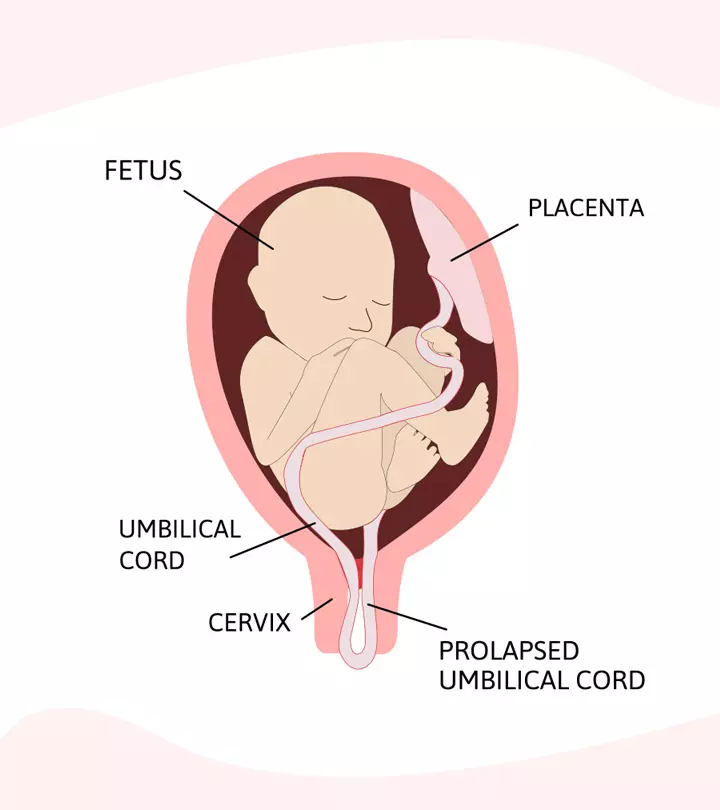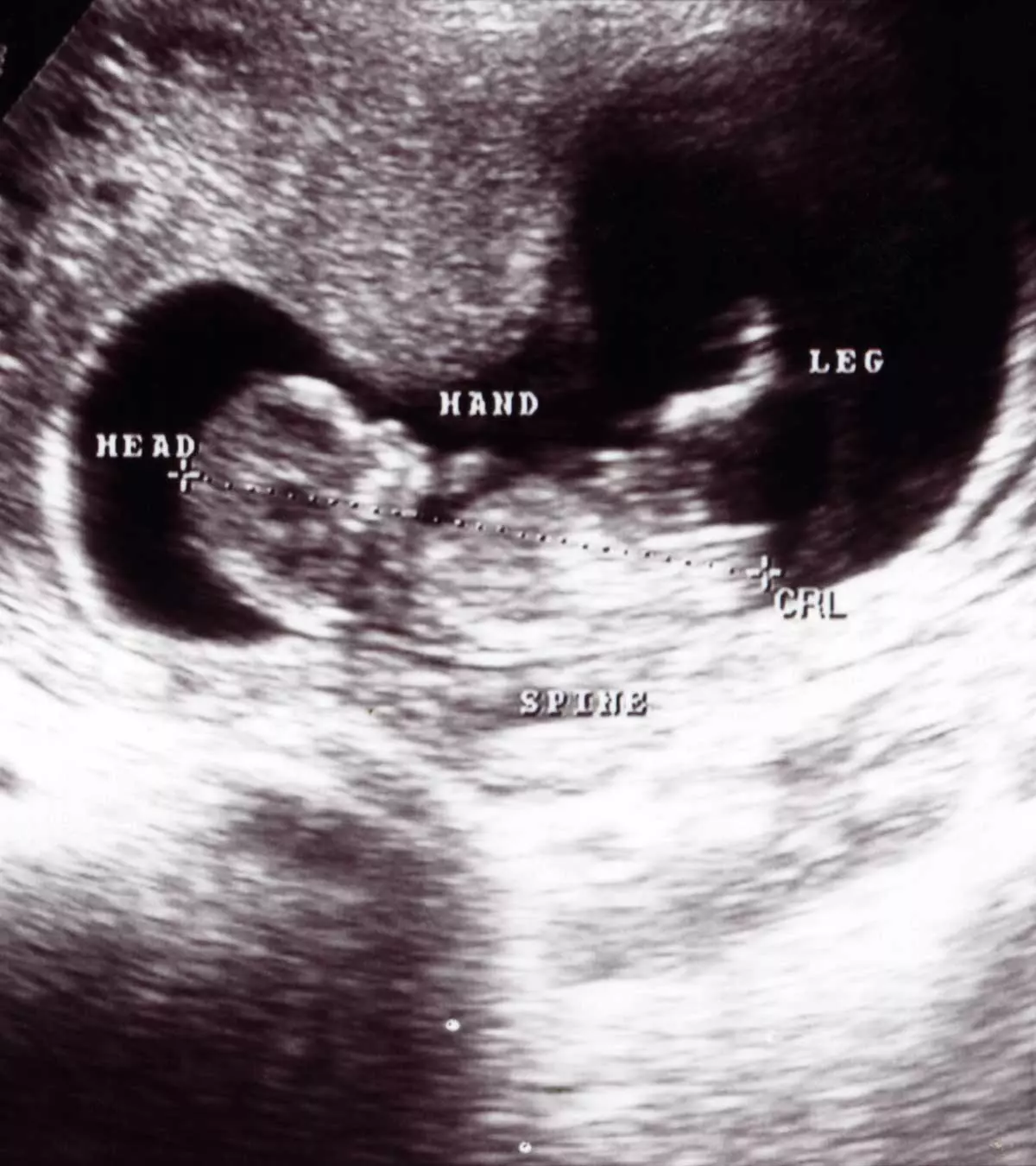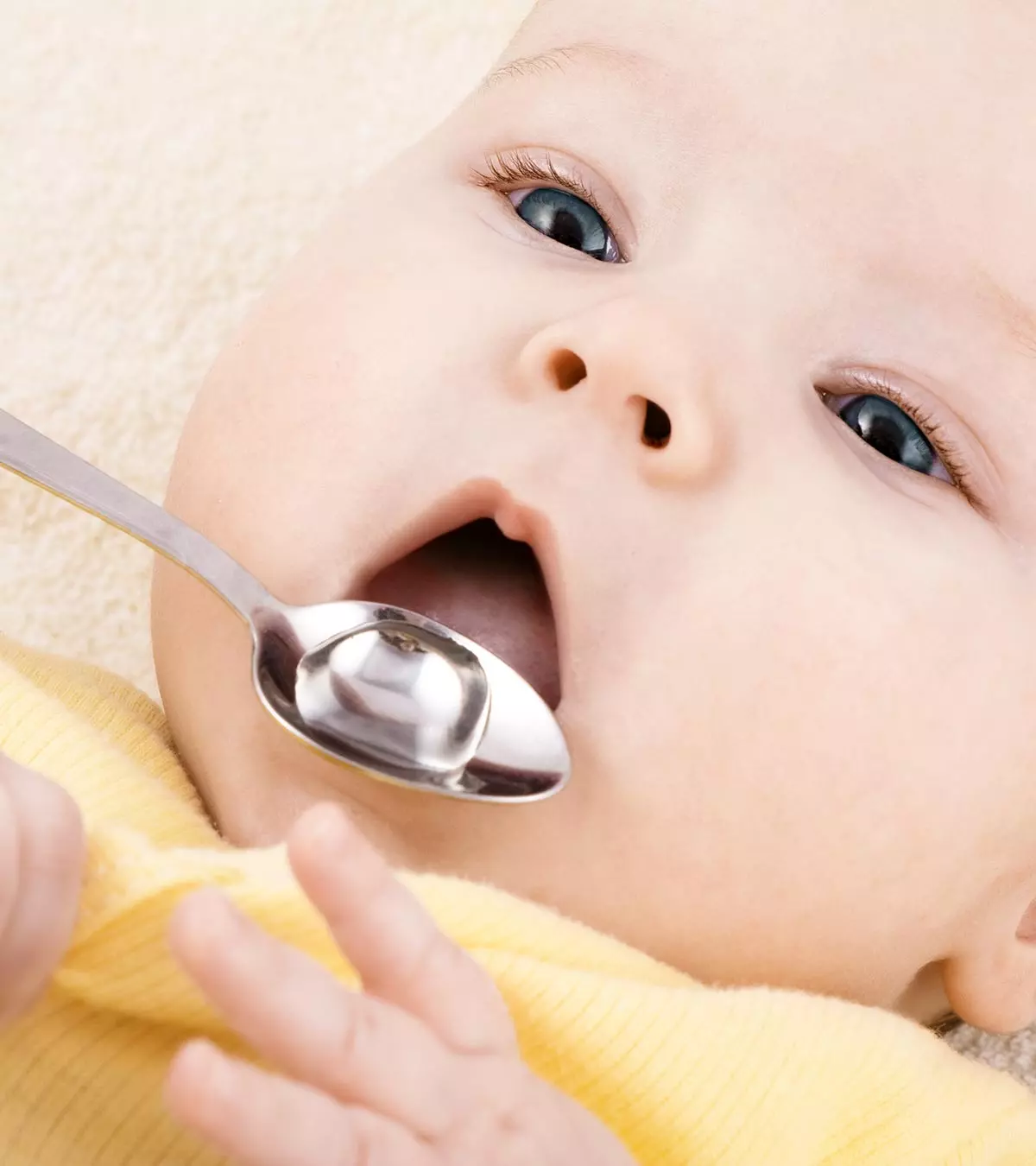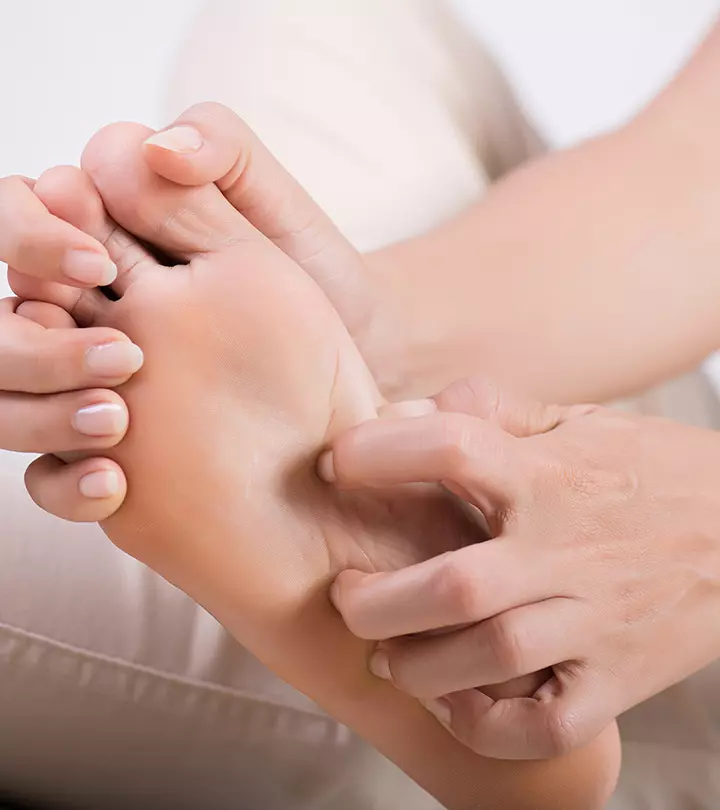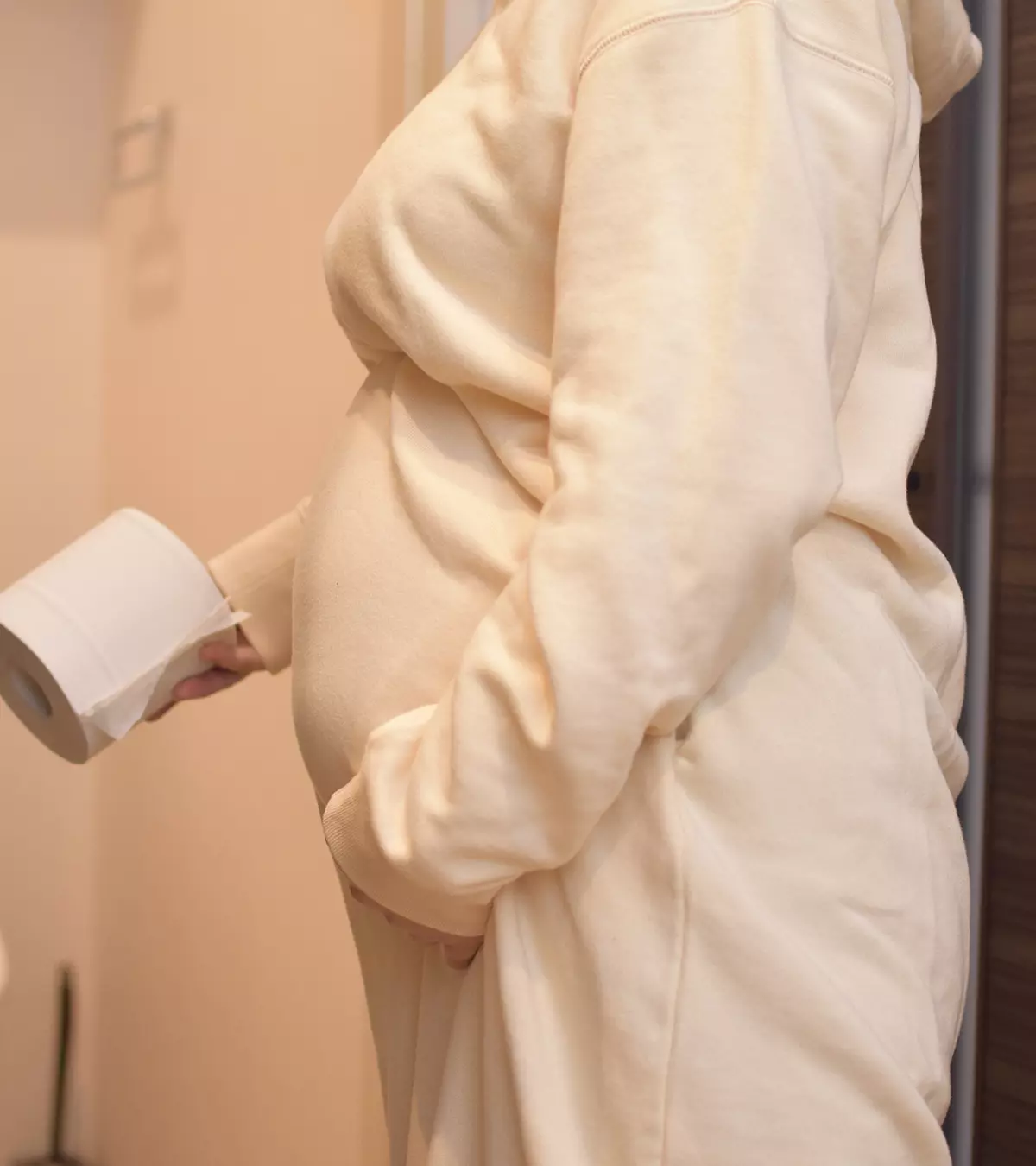
Image: ShutterStock
Vaginal pain during pregnancy is common. Expansion of the uterus causes vaginal pain in the early weeks of gestation. In later trimesters, cervical dilation, the baby’s weight, and increased blood flow to the vagina may cause pain. Most women may feel sharp or shooting pain when the vaginal ligaments are stretched during pregnancy. It is not a sign of any medical problems in most cases. Prenatal massages and pelvic floor exercises help many mothers relieve vaginal pain in pregnancy.
Read on to know the causes and remedies for vaginal pain during pregnancy.
Key Pointers
- Vaginal pain during pregnancy occurs due to increased blood flow, dilation, or infections, to name a few.
- Warm water bath and pelvic massage could be a few ways to relieve pain.
- Usually, the pain settles down in time, but if it gets intense and is accompanied by fever, visit the doctor.
What Causes Vaginal Pain During Pregnancy?
Vaginal or pelvic pain during pregnancy could be due to several reasons as your body adapts to the new changes.
The following are the reasons that are likely to cause pain in the vaginal region.
- Blood flow: During pregnancy, there is usually an increased flow of blood within the uterus (1), which could cause pain in the vaginal area. The area may get tender and swollen even when nudged. Pain could also be due to vaginal varicosity or enlarged blood vessels in the pelvic area in some cases.
- Infections: Vaginal pain may also occur due to fungal infections around the vaginal region. Sometimes, pelvic/vaginal infections may cause pain along with other symptoms, such as vaginal discharge during pregnancy, nausea, diarrhea, or backache. Candidiasis is a common infection in pregnant women (2).
 Quick fact
Quick fact- Cervix dilation: If it is a stabbing pain, especially in the later stage of pregnancy, it could be due to the dilation of the cervix (3). The cervix dilates a few weeks before labor, and that could cause pain along with bleeding.
- Fetal pressure: The growing fetus puts pressure on the pelvic area that stretches the ligaments and muscles, causing pinching pain. This pain may last for a few seconds or minutes and sometimes longer. It may occur in the first trimester when the uterus is enlarging and putting pressure on the bladder and rectum, in the second trimester when the baby is pressing against the pelvic region, or in the third trimester when the baby is moving down.
- Ectopic pregnancy: Vaginal pain is one of the symptoms of ectopic pregnancy (4), which is usually difficult to diagnose. The other symptoms of this pregnancy could be abnormal bleeding, sore breasts, dizziness, lower back pain, fainting, shortness of breath, and low blood pressure.
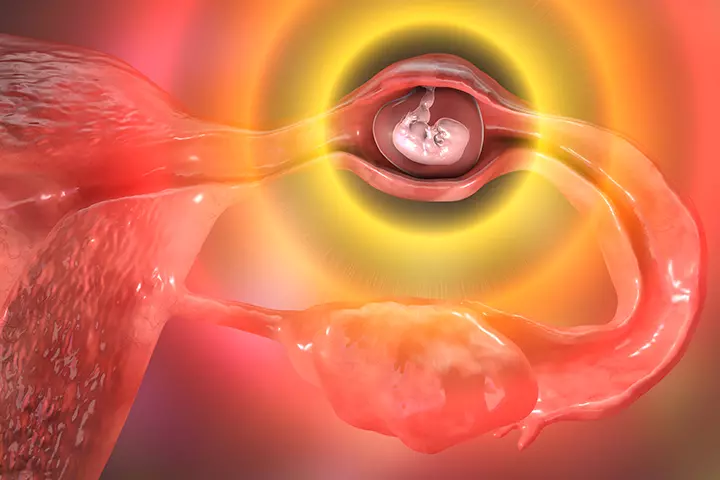
Vaginal pain could also occur due to other reasons such as constipation and gassiness, following sexual intercourse or improper exercise or wrong sleeping postures, or just stress.
Cramp-like vaginal pain, along with bleeding, might indicate a miscarriage or ectopic pregnancy in the early part of pregnancy (5). Therefore, if you feel pain in your vagina, try to identify if it is a common or a serious issue.
Ways To Get Relief From Vaginal Pain During Pregnancy
In most cases, vaginal pain may subside with some simple measures. Here are a few such ways to get relief:
- Lie down on your left as it might improve the blood circulation and reduce vaginal pressure.

- When sitting, keep your feet elevated to get some relief from the pressure and pain.
- Warm water baths could help you relax. You might also stand under the shower and allow the water to fall on your back.
- Lie down with hips elevated.
- Get a pelvic massage by a trained masseuse.
- Do some simple exercises such as yoga and swimming after getting clearance from your healthcare provider, midwife, or obstetrician.

- Pelvic exercises such as pelvic rolls and tilts may also help.
- Use support belts that are designed to support the belly, lower back, pelvis, and hips.
Also, avoid jerky movements and sudden twists at the waist. Do not take pain relief medications without a prescription.
How Would Vaginal Pain Impact Your Daily Life?
The pain might have an impact on the joints, bones, and muscles. Walking, driving over uneven roads, and climbing stairs may aggravate the pain. You might feel increased pressure on the vagina as you move towards delivery. The pain and pressure might aggravate as the baby drops into the pelvic region to prepare itself for delivery. Many women may also feel anxious or stressed about their symptoms, which can affect their overall well-being.
Care and attention at home could help you get some relief from the pain.
When To See A Doctor

Use your prenatal appointment with your doctor to talk about vaginal pain if it is mild. But if the pain is intense, and is accompanied by a fever, headache, dizziness, bleeding, painful and frequent urination, change in baby movements, and swelling of the face, hands, and feet, seek medical help. Prompt treatment might help in avoiding any complications.
What Is The Difference Between Vaginal Pain And Pressure?
Often, we tend to mistake pain for pressure. Pain is sharp enough to make it difficult for you to walk, while pressure is similar to the ache you may experience during menstrual cramps and is spread to the lower back too.
Types Of Vaginal Pain
Observing the pain and identifying its type may also help you to explain the symptoms to your gynecologist or obstetrician.
- Mild stabbing vaginal pain: Prickling pain is common among pregnant women. It may occur due to the stretching of uterine muscles, due to gas formation, or constipation. If you experience this type of pain around the 37th week, it might be due to the upcoming labor, or just the baby trying to move down into the pelvis. There is no reason to worry if the pain is minor and does not last long. However, if it is associated with heavy spotting or bleeding, you should see a doctor.
- Nagging vaginal pain: This pain is experienced by both pregnant and non-pregnant women. It may occur due to inflammation of the pelvic organs. If the pain is accompanied by contractions or is gradually increasing, then discuss it with your doctor.
- Cutting vaginal pain: In most cases, minor cutting pain may occur due to the growing uterus. It could also be a symptom of interstitial cystitis (inflammation or pain of the bladder, urethra, or pelvic area) (6). If the pain is severe in the later stages of pregnancy, it may be due to placental detachment or abruption of the placenta (7).
Whatever might be the type of pain, talk to your doctor about it. They will examine and advise you accordingly. In general, if the pain is becoming frequent, getting more intense with time, associated with the tightening of uterus, vaginal bleeding, or increased vaginal discharge, then it might be a progression of labor. You might need to be checked for labor onset or progression.
Is Lightning Crotch A Sign Of Labor?
Lightning crotch refers to the sudden shooting or stinging pain in the vaginal or pelvic region that may occur in late pregnancy. It occurs when the baby in the uterus drops into the pelvis area before birth.
 Quick fact
Quick factSince the baby’s head is now in the lower pelvic region (also known as engagement), the pressure on the cervix and the nerves around the lower part of the uterus is increased, which may cause sporadic pain. The pain usually lasts a few seconds and does not indicate labor or an underlying issue. However, you must call your doctor if the pain lasts over a minute (8). It is important to note that even if the lightning crotch is not an active sign of labor, it suggests that you may go into labor within a few days or weeks (9).
Frequently Asked Questions
1. Can vaginal pain during pregnancy harm the fetus?
Vaginal pain during pregnancy is not known to directly harm the fetus. If it is accompanied by other symptoms, it may indicate an underlying condition that needs medical attention, which, if left untreated, can potentially affect the health of both the mother and the fetus.
2. Are over-the-counter pain medications safe to use during pregnancy?
Not all over-the-counter pain medications are safe to use during pregnancy. Some medications, the non-steroidal anti-inflammatory drug (NSAID) family of painkillers such as ibuprofen, naproxen, and diclofenac, can be harmful to the developing fetus and should be avoided. However, some pain medications, such as paracetamol and codeine, are generally considered safe to use during pregnancy (10). Check with your healthcare provider before taking any medication during pregnancy.
3. How can women prevent vaginal pain during pregnancy?
Vaginal pains are common and unavoidable during pregnancy. Following the measures that can offer relief from vaginal pain can help manage it during pregnancy.
4. Can vaginal pain during pregnancy impact labor and delivery?
Vaginal pain during pregnancy may potentially affect labor and delivery. The severity of the pain may vary from woman to woman Vaginal infections due to allergies or pelvic floor disorders may increase the risk of complications during childbirth and may require other medical interventions. Pain during labor is inevitable but can be managed by regular physical activity aimed at strengthening muscles (11).
5. Are there any long-term effects of vaginal pain during pregnancy?
Studies that suggest the long-term effects of vaginal pain during pregnancy are limited. However, if left untreated, underlying conditions that cause vaginal pain during pregnancy, such as vaginal infections or pelvic floor disorders, may potentially lead to long-term complications.
6. How can I differentiate between lightning crotch and other pelvic pains?
Lightning crotch pain differs from other common pelvic pains like round ligament pain and sciatica in terms of location, nature, and timing. Round ligament pain is more common in mid-pregnancy, feels dull or achy, and spreads toward the hips. Sciatica, a nerve pain, can occur at any time in pregnancy and is felt around the lower back and leg. Lightning crotch feels like a sudden electric shock in the pelvis, usually occurring late in the third trimester (8).
7. Can vaginal pain during pregnancy impact a woman’s sexual experience and desire?
Vaginal pain during pregnancy may potentially impact a woman’s sexual experience and desire. Pain during intercourse or discomfort in the pelvic area can lead to depression, decreased sexual desire, and decreased sexual activity (12).
Vaginal pain during pregnancy is a common symptom as the developing fetus exerts pressure on the bones of the pelvic region. You could try taking warm baths, lying down sideways, or with your hips elevated and getting a pelvic massage to gain relief from the pain. But if the pain is frequent, intense, and accompanied by signs of dizziness, pain while urinating, or a change in the baby’s movements, consult the doctor immediately. Do not neglect any pain, cramping, or discomfort during pregnancy and get immediate medical attention to avoid complications.
Infographic: What Are The Possible Complications Of Unmanaged Vaginal Pain In Pregnancy?
Vaginal changes and pressure from the uterus can cause vaginal pain during pregnancy in most women. This may get better after the postpartum period. However, vaginal pain due to infectious or allergic conditions should be addressed promptly to avoid complications. Go through the infographic below to learn the potential complications of untreated vaginal pain during pregnancy. Illustration: Momjunction Design Team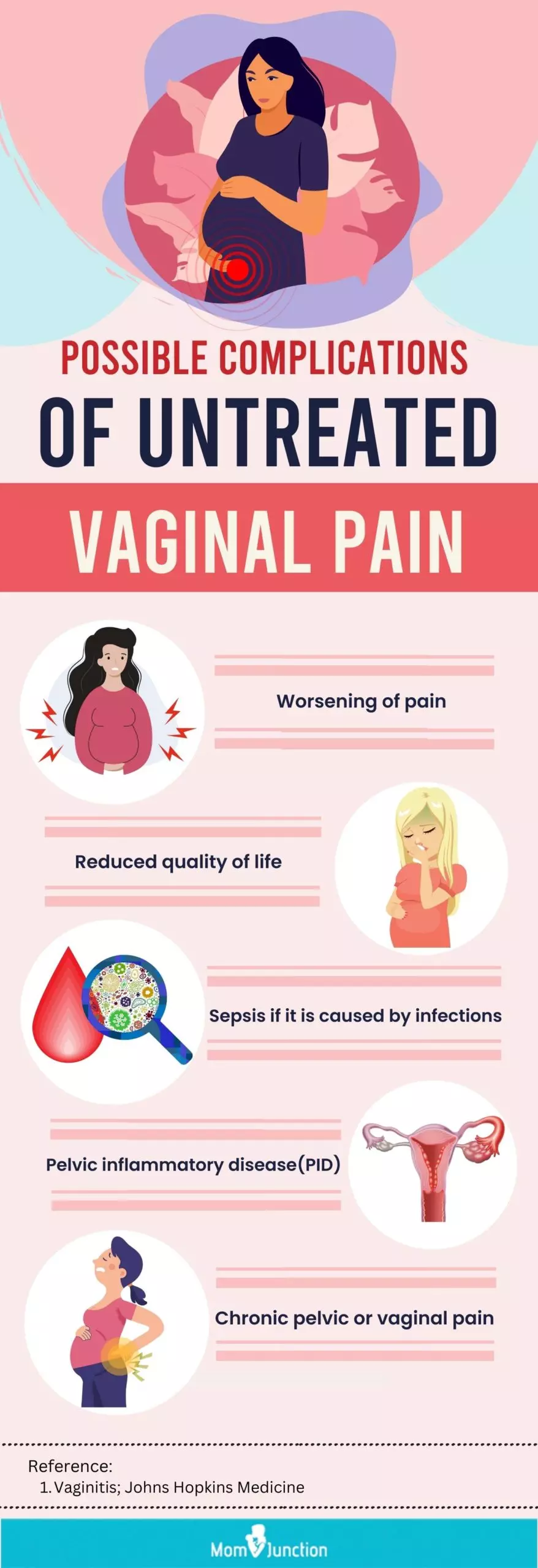
Illustration: Vaginal Pain During Pregnancy: Causes & Ways To Get Relief

Image: Stable Diffusion/MomJunction Design Team
Pregnancy may lead to sharp pains in your vaginal area. You may wonder what could be causing this and what you should do. Watch this video to understand what’s going on and how to get relief.
References
1. Antenatal care module: 7. physiological changes during pregnancy; The Open University (2019)
2. Candidiasis Basics; CDC
3. Preparing for labor and delivery; Baystate Health Organization
4. Ectopic Pregnancy; Nemours KidsHealth
5. Pregnancy – bleeding problems; Department of Health & Human Services, State Government of Victoria, Australia
6. Painful Bladder Syndrome (Interstitial cystitis); Women’s Pelvic Health and Reconstructive Surgery; University of Mississippi Medical Center
7. Bleeding in Pregnancy/Placenta Previa/Placental Abruption; The Children’s Hospital of Philadelphia
8. Lightning Crotch Pain During Pregnancy; American Pregnancy Association
9. Signs of Labor; American Pregnancy Association
10. Pain relief; UK Teratology Information Service (UKTIS)
11. Dealing With Pain During Childbirth; Nemours Kids Health
12. Niklas Rexelius et al.; Sexuality and mood changes in women with persistent pelvic girdle pain after childbirth: a case-control study; BMC Women’s Health
13. Answers to 6 burning questions about yeast infection during pregnancy; The University of Texas Southwestern Medical Center
14. Lightning Crotch; Cleveland Clinic
Community Experiences
Join the conversation and become a part of our nurturing community! Share your stories, experiences, and insights to connect with fellow parents.
Read full bio of Dr. Anita Gondy
Read full bio of Rebecca Malachi
Read full bio of Dr. Ritika Shah
Read full bio of Reshmi Das










